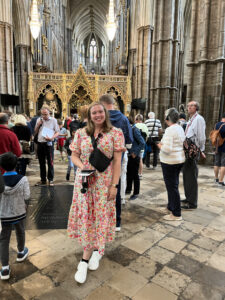
A week before my twenty-first birthday, I found myself outside the closed security gate of John F. Kennedy International Airport in New York. The giant lobby clock approached two in the morning, and I started to think, “I really hope this is worth it.” I had nothing but the backpack on my back–my luggage back in Cincinnati after two rerouted flights–and three hours until I could pass through the security checkpoint to hopefully catch my first wink of sleep in over twenty-four hours. Barely halfway through my first journey overseas, I found my morale dwindling; today, I am certain I’d do it again.
Hailing from a small town in western Kentucky, I never dreamed as a child that I would one day leave the country, and especially not as a young adult. From my perspective, simply moving across the state for college felt like a leap of faith. As I submitted my application for the Travel and Learn Abroad program for the English-Speaking Union Kentucky Branch, I knew that given the opportunity, this could be a trip that no other in my family had previously experienced. Upon my acceptance, I felt a growing anticipation for the courses I would take, the people I would meet, and the memories I would make. As I left my parents in Cincinnati, I began to wonder if I would miss them as I began to take in the historic sights that London has to offer.
My travel buddy–another scholar with the Kentucky Branch–and I had a perfect flight schedule: Cincinnati to New York, then on to London, arriving the next morning. However, as luck would have it, a system of thunderstorms crept into New York on the evening we left. Our London flight already moved to the next morning, we took this initial setback with grace. After waiting in line until the moment the flight boarded, we agreed to fly first to Raleigh, North Carolina and then to New York when the storms calmed down. Upon our arrival in Raleigh, we discovered our luggage had been left in Cincinnati, and we would be unable to file a report for our luggage until our arrival in London. We faced minor delays in Raleigh, but touched down in New York with plenty of time to sort out our luggage situation before our morning flight. After groggily waiting for security to open and taking shifts napping, we boarded our flight and headed off to London.
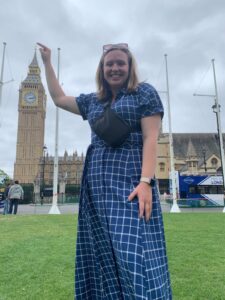
Our first weekend abroad brought an influx of new sights and experiences, mixed with attempts to overcome our jet lag and frustrations with our lost luggage. I found myself in awe walking through the city, and my favorite experience had to be an afternoon performance of A Midsummer Night’s Dream at Shakespeare’s Globe. We even received our lost luggage on the day before my twenty-first birthday! We spent the occasion exploring Sherlock Holmes’ house, strolling Hyde Park, and museum-hopping. Following a week in London, we headed off to the train station–all our possessions in tow. Immersing myself in English literature, history, and culture provided me the ideal environment to settle my nerves before taking on the summer school program at Oxford.
Our arrival at Exeter College that evening left me wondering if I had mistakenly ended up at Hogwarts; we attended a courtyard reception followed by dinner in the candlelit dining hall. As the night went on, I met scholars and teachers from all corners of the world and made the acquaintance of peers in my academic seminars. The summer school hosted two programs at the same time; while I was engaged in the History, Politics, and Society (HPS) program, I made friends in the much larger English Literature program. Each scholar participated in daily plenary lectures as well as two seminars. Our smaller HPS group meant that our seminars felt more like tutorials, with sometimes only three scholars enrolled.
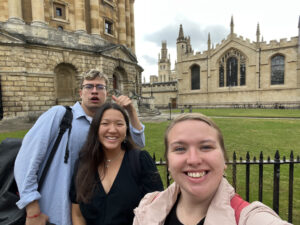
My first seminar, called Gender, Power, and Social Change, explored theories of gender used in modern sociology and psychology, focusing on a gendered power dynamic in Western societies. Our group consisted of six scholars from Spain, China, India, Canada, and the United States. As a result, our various discussions–regarding sexuality, gender power, and social constructs–proved lively and multi-faceted. To receive course credit with our universities, we were tasked with writing an essay over the span of two weeks, answering one of a provided list of prompts. My essay titled, “Can men be feminists?”, explored the historical and modern definitions of both men and feminism, then drawing conclusions about how these two concepts interact in modern society.
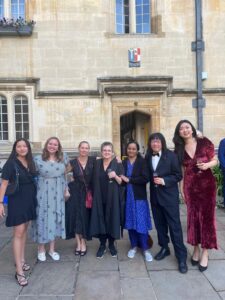
My second seminar, European Union Politics, discussed the issues which led to the creation of the European Union and its reactions to subsequent crises including the 2015 migrant crisis, the Brexit decision of 2016, and the recent Russian invasion of Ukraine. Our course consisted of only three scholars–myself and two scholars from Spain and the United Kingdom. This spread resulted in an intriguing dynamic: one scholar who had lived in the European Union their entire life (and whose country stood next in line for the EU presidency), one scholar who had experienced Brexit firsthand, and one scholar who had never lived in the European Union. For my credit essay, I explored the rise of the far-right Alternativ für Deutschland (AfD) party in Germany and how its prominence threatens European integration and many of the European Union’s primary goals.
Although two and a half weeks is a small amount of time to write over five thousand words, I managed to squeeze in plenty of exploration in my time at Oxford. When I was not holed up in the iconic Radcliffe Camera writing, I found myself wandering the same cobblestone streets as C.S. Lewis, J.R.R. Tolkien, and T.S. Eliot. When stressed, I decompressed with walks through the university gardens and breaks by the river. In the evenings, my peers and I explored the vibrant bar culture Oxford has to offer. Our programs provided additional events, including debates, guided tours, and socials.
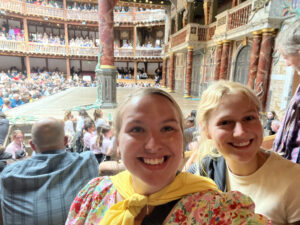
At the end of the program, we sat down with each of our tutors for constructive feedback regarding our essays, including a final grade. The Oxford grading scale proves daunting to an American student, as First-Class Honours (the American “A”) are achieved at a score of seventy-percent or higher. Due to the elevated academic regimen at Oxford, the typical “A” student in the United States might be surprised to receive marks in the sixty-percent range–a failing grade in their home system. I set my personal goal at Second-Class Upper Division (sixty-percent range) for both courses. I met that goal with my European Union Politics course, and exceeded my goal in Gender, Power, and Social Change, earning First-Class Honours. In discussions with my tutors, I received permission to publish one of my essays in addition to encouragement to pursue the study of history further. These endorsements provided me with a refreshed confidence in my abilities just in time for my senior year applications.
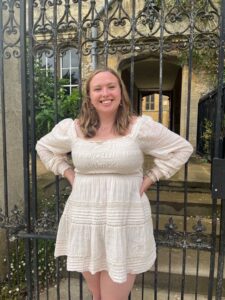
As I reflect on that summer, over two years ago now, I consider it a major turning point in my life. That seemingly brief month taught me numerous lessons about life and the world; I tackled my inner concerns that a small-town girl could handle the academic regimen provided at Oxford, and learned that academic success comes less from what you know and more from what you are willing to learn. Personally and professionally, my brief stint at Oxford inspired me to set my goals higher than imagined, with confidence. The most important lesson I learned, perhaps, is that the hardest of journeys to a destination tend to result in the best experiences. This lesson has proved invaluable as I navigated living in northwestern Germany for ten months and as I moved back home to begin my career, long after I left for Oxford.